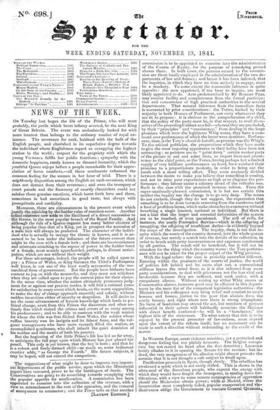NEWS OF THE WEEK.
ON Tuesday last began the life of the Prince, who will most probably, the perils which beset infancy averted, be the next King of Great Britain. The event was undoubtedly looked for with more interest than belongs to the ordinary routine of royal ex- istence. The reverence for rank, habitual with the bulk of the English people, and cherished in its superlative degree towards the individual whom Englishmen regard as occupying the highest station in the world ; respect for the propriety with which the young VICTORIA fulfils her public functions ; sympathy with the domestic happiness, rarely known to throned humanity, which the youthful Queen enjoys before a people remarkable for their appre- ciation of home comforts,—all these sentiments enhanced the common feeling for the woman in her hour of trial. There is a neighbourly disposition among the English on such occasions, which does not detract from their reverence ; and even the trumpery of court parade and the flummery of courtly chroniclers could not subdue those genuine emotions, which burst forth here and there, sometimes in bad sometimes hr good taste, but always with promptitude and cordiality.
Moreover, there are circumstances in the present event which justify the rejoicing by the harder rules of common sense. Another infant existence now adds to the likelihood of a direct succession to the throne, in the most popular branch of the Royal Family. And although the rule of a Queen-regnant has many better chances of being popular than that of a Kibg, yet in prospect the accession of a male heir will always be preferred. The character of the indivi- dual who is actually to occupy the throne is known, and it is as- sumed to be less under the influence of the future consort than might be the case with a female heir ; and there are inconveniences and mistrusts attaching to the repose of power in the feebler hand of a female, most acutely apprehended, perhaps, in distant antici- pation, which are not without their weight.
For these advantages, indeed, the people will be called upon to pay : a Prince of Wales, as King GEORGE the Third's Parliaments
, well knew, is not one of the least costly accessories of the mo- narchical form of government. But the people have hitherto been content to jog on with the monarchy, and they must not withdraw when they are called upon to pay the current price for their choice. In the mean time, whether the nation ultimately pronounce judg- ment for or against our present modes, it will find a rational cause for satisfaction in every event which tends, on the worst supposition, to make the day of change approach smoothly and calmly, without sudden incursions either of anarchy or despotism. It will desire to see the same advancement of human knowledge which leads to po- litical change, avert from this Prince the disastrous and often un- timely fate which visited the crimes and errors of so many among his predecessors ; and to be able to contrast with the weak minion for whom the title was first filched from Wales, the soldier whose ruffian bravery won its insignia and its falsest fame, and the vul- garer transgressors who have more recently filled the station, an accomplished gentleman, who shall inherit the quiet dominion of his mother and the merits of both his parents.
But the beginning of the little Prince's life has led us far away, to anticipate the full page upon which History has just placed her pencil. This only is yet known, that the boy is born ; and that he is a robust and finely-formed child—as much so, some indiscreet courtier adds' 01 as George the Fourth." His future subjects, it may be hoped, will not extend the comparison.


























